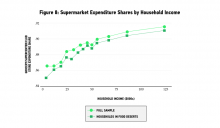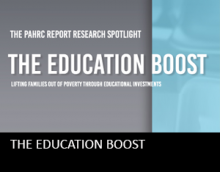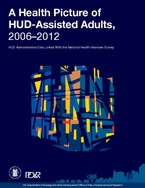0
News Article
Community:
Jul 10, 2018
Authored by: Tina Rosenberg for The New York Times
Topics: Child welfare, Criminal justice, Domestic violence, East Coast, Family engagement, Housing, Legislation & Policy, Low-income, Research, Safety, Supportive housing, Youth
 Shared by Housing Is
Shared by Housing Is
Housing Is posted a
on Jul 10, 2018
Tina Rosenberg for The New York Times
0
News Article
Community:
Jul 5, 2018
"There's no silver bullet" to end chronic absenteeism, but a simple "nudge" letter has shown real success in reducing truancy. It's working in Tacoma, and it's caught the interest of the Seattle Housing Authority, which houses 10 percent of Seattle's public-school students.
Authored by: Neal Morton for The Seattle Times
Topics: Attendance, Dual-generation, East Coast, Education, Family engagement, Low-income, Research, West Coast, Youth
 Shared by Housing Is
Shared by Housing Is
Housing Is posted a
on Jul 9, 2018
Neal Morton for The Seattle Times
"There's no silver bullet" to end chronic absenteeism, but a simple "nudge" letter has shown real success in reducing truancy.
0
News Article
Community:
Dec 11, 2017
Authored by: Elizabeth A. Harris for The New York Times
Topics: Attendance, Child welfare, East Coast, Education, Grade-level proficiency, Homelessness, Housing, Legislation & Policy, Low-income, Metrics, Out-of-school time, Racial inequalities, Research, School-readiness, Stability, Youth
 Shared by Housing Is
Shared by Housing Is
Housing Is posted a
on Jul 5, 2018
Elizabeth A. Harris for The New York Times
0
Report
Community:
Dec 6, 2017
It adds to the growing body of evidence that addressing homelessness saves money elsewhere.
Authored by: J.B. Wogan for Governing the States and Localities
Topics: Cost effectiveness, Criminal justice, Health, Healthy homes, Homelessness, Housing, Legislation & Policy, Place-based, Preventative care, Research, Stability, West Coast
 Shared by Housing Is
Shared by Housing Is
Housing Is posted a
on Jul 5, 2018
J.B. Wogan for Governing the States and Localities
It adds to the growing body of evidence that addressing homelessness saves money elsewhere.
0
Report
Community:
Jun 1, 2017
Over the past year, the United States Conference of Mayors and the Brookings Institution, along with the Project for Public Spaces have worked together to capture a new model of growth that is emerging in cities and the particular roles that mayors can play.
Authored by: Julie Wagner, Jennifer S. Vey, Steve Davies, and Nathan Storring for Brookings Institute
Topics: Asset building, Community development, Cost effectiveness, Funding, Legislation & Policy, Place-based, Research
 Shared by Housing Is
Shared by Housing Is
Housing Is posted a
on Jul 5, 2018
Julie Wagner, Jennifer S. Vey, Steve Davies, and Nathan Storring for Brookings Institute
Over the past year, the United States Conference of Mayors and the Brookings Institution, along with the Project for Public Spaces have worked together to capture a new model of growth that is emerging in cities and the particular roles that mayors can play.
0
Interactive
Community:
Dec 21, 2017
Authored by: Domenick Lasorsa for the National League of Cities
Topics: Community development, Cost effectiveness, Housing, Legislation & Policy, Low-income, Metrics, Partnerships, Place-based, Research, Stability, Workforce development
 Shared by Housing Is
Shared by Housing Is
Housing Is posted a
on Jul 5, 2018
Domenick Lasorsa for the National League of Cities
0
Research
Community:
Jan 18, 2018
A new study suggests that America’s great nutritional divide goes deeper than the problem of food access within cities.
Authored by: Richard Florida for City Lab
Topics: Child welfare, Food insecurity, Health, Low-income, Nutrition, Obesity, Racial inequalities, Research
 Shared by Housing Is
Shared by Housing Is
Housing Is posted a
on Jul 5, 2018
Richard Florida for City Lab
A new study suggests that America’s great nutritional divide goes deeper than the problem of food access within cities.
0
Research
Community:
Jan 1, 2018
Authored by: Michelle S. Manno and Jennifer Miller Gaubert for Implementation Research Incubator (MDRC)
Topics: Research
 Shared by Housing Is
Shared by Housing Is
Housing Is posted a
on Jul 5, 2018
Michelle S. Manno and Jennifer Miller Gaubert for Implementation Research Incubator (MDRC)
0
Research
Community:
Jan 1, 2018
A Promising Approach to Improving Student Outcomes
Authored by: Janet Quint and Barbara Condliffe for MDRC
Topics: Child welfare, Education, Funding, Mental health, Metrics, Place-based, Research, Youth
 Shared by Housing Is
Shared by Housing Is
Housing Is posted a
on Jul 5, 2018
Janet Quint and Barbara Condliffe for MDRC
A Promising Approach to Improving Student Outcomes
0
News Article
Community:
Jan 24, 2018
Authored by: Lee Romney for EdSource
Topics: Child welfare, Early childhood, Education, Mental health, Post-secondary, Research, Safety, South, Youth
 Shared by Housing Is
Shared by Housing Is
Housing Is posted a
on Jul 5, 2018
0
News Article
Community:
Jan 29, 2018
Chicago’s troubling homicide rate could be significantly reduced through a massive increase in state spending for Chicago schools.
Authored by: Larry Yellen for Fox 32
Topics: Child welfare, Community development, Cost effectiveness, Education, Funding, Legislation & Policy, Low-income, Midwest, Research, Safety, Youth
 Shared by Housing Is
Shared by Housing Is
Housing Is posted a
on Jul 5, 2018
Chicago’s troubling homicide rate could be significantly reduced through a massive increase in state spending for Chicago schools.
0
News Article
Community:
Feb 15, 2018
Authored by: Jon Marcus and Matt Krupnick for The Hechinger Report (originally featured in The Atlantic)
Topics: Community development, Education, Family engagement, Low-income, Midwest, Post-secondary, Research, Workforce development, Youth
 Shared by Housing Is
Shared by Housing Is
Housing Is posted a
on Jul 5, 2018
Jon Marcus and Matt Krupnick for The Hechinger Report (originally featured in The Atlantic)
0
Report
Community:
Mar 6, 2018
MDRC, a nonprofit, nonpartisan education and social policy research firm, released encouraging results from a demonstration, funded by Robin Hood, of two aligned interventions in New York City.
Authored by: MDRC
Topics: Early childhood, Education, Grade-level proficiency, Low-income, Metrics, Racial inequalities, Research, Youth
 Shared by Housing Is
Shared by Housing Is
Housing Is posted a
on Jul 5, 2018
MDRC, a nonprofit, nonpartisan education and social policy research firm, released encouraging results from a demonstration, funded by Robin Hood, of two aligned interventions in New York City.
0
Report
Community:
Jun 29, 2017
Violent-crime arrests drop by 33 percent for program participants.
Authored by: UChicago News
Topics: Child welfare, Criminal justice, Education, Low-income, Midwest, Mobility, Out-of-school time, Post-secondary, Racial inequalities, Research, Safety, Substance abuse, Workforce development, Youth
 Shared by Housing Is
Shared by Housing Is
Housing Is posted a
on Jul 5, 2018
Violent-crime arrests drop by 33 percent for program participants.
1
News Article
Community:
Jul 3, 2018
Researchers have shown — and teachers know — that schoolchildren exposed to neighborhood violence can have a tougher time learning, experiencing more stress and depression than their peers growing up in safe neighborhoods. But a Johns Hopkins University sociologist discovered that the consequences of neighborhood violence reach further than previously known, even spilling over to students who come from safe neighborhoods. Using crime and student data from Chicago, Julia Burdick-Will linked exposure to neighborhood violence to a drop in test scores, an effect that extended to students coming from communities that experienced little or no violence.
Authored by: Moriah Balingit for The Washington Post
Topics: Attendance, Child welfare, Community development, Depression, Education, Health, Low-income, Mental health, Midwest, Out-of-school time, Post-secondary, Racial inequalities, Research, Youth
 Shared by Mica O'Brien
Shared by Mica O'Brien
Mica O'Brien posted a
on Jul 3, 2018
Moriah Balingit for The Washington Post
Researchers have shown — and teachers know — that schoolchildren exposed to neighborhood violence can have a tougher time learning, experiencing more stress and depression than their peers growing up in safe neighborhoods.
0
News Article
Community:
Jul 2, 2018
Poor children don't struggle in school because of their parents. They struggle because of poverty.
Authored by: Mical Raz for The Washington Post
Topics: Attendance, Child welfare, Dual-generation, Early childhood, Education, Family engagement, Food insecurity, Grade-level proficiency, Housing, Legislation & Policy, Literacy, Low-income, Out-of-school time, Post-secondary, Racial inequalities, Research, School-readiness, Youth
 Shared by Mica O'Brien
Shared by Mica O'Brien
Mica O'Brien posted a
on Jul 3, 2018
Mical Raz for The Washington Post
Poor children don't struggle in school because of their parents. They struggle because of poverty.
0
Report
Community:
Nov 1, 2017
Why do some neighborhoods appear able to launch effective local improvement initiatives, while others are more hampered by fragmentation and mistrust? Why can some communities mobilize diverse constituencies to influence public policy, while others cannot? Answers to these questions may be found in the specific patterns of collaboration that form among community organizations, and between these groups, schools, public agencies, and elected officials, according to MDRC, a preeminent social-policy research organization.
Authored by: MDRC
Topics: Asset building, Child welfare, Community development, Data sharing, Dual-generation, Education, Family engagement, Funding, Health, Housing, Legislation & Policy, Low-income, Metrics, Midwest, Mobility, Out-of-school time, Partnerships, Place-based, Preventative care, Research, Safety, Stability, Workforce development, Youth
 Shared by Mica O'Brien
Shared by Mica O'Brien
Mica O'Brien posted a
on Jun 29, 2018
Why do some neighborhoods appear able to launch effective local improvement initiatives, while others are more hampered by fragmentation and mistrust? Why can some communities mobilize diverse constituencies to influence public policy, while others cannot?
1
Video
Community:
May 23, 2018
The Council of Large Public Housing Authorities (CLPHA) hosted The Housing Is Summit in Washington, D.C., on May 3-4, 2018 with 300 partners across the housing, education, and healthcare sectors. Access video recordings of the Summit's keynote speakers (HUD Secretary Ben Carson, John Bridgeland, Matthew Morton), plenary panels (on topics that cut across sectors like anchor institutions, data collaboration, stability, and foundation investments), and select breakout sessions focused on the intersections of housing, education, and health.
Authored by: Council of Large Public Housing Authorities
Topics: Affordable Care Act, Attendance, Child welfare, CLPHA, Community development, Data sharing, Dual-eligibles, Dual-generation, Early childhood, Education, Funding, Grade-level proficiency, Health, Healthy homes, Homelessness, Housing, Legislation & Policy, Low-income, Medicaid / Medicare, Mental health, Metrics, MTW, Out-of-school time, Partnerships, Place-based, Preventative care, Racial inequalities, Research, School-readiness, Seniors, Stability, Substance abuse, Supportive housing, Sustainability, TA, Workforce development, Youth
 Shared by Steve Lucas
Shared by Steve Lucas
Steve Lucas posted a
on May 23, 2018
The Council of Large Public Housing Authorities (CLPHA) hosted The Housing Is Summit in Washington, D.C., on May 3-4, 2018 with 200 partners across the housing, education, and healthcare sectors. The Summit highlighted the ways that we can transform systems to better serve low-income people with two days of plenary speakers/panels, breakout sessions, and caucus discussions geared toward intersectional thinking and ways to take action.
Council of Large Public Housing Authorities
The Council of Large Public Housing Authorities (CLPHA) hosted The Housing Is Summit in Washington, D.C., on May 3-4, 2018 with 300 partners across the housing, education, and healthcare sectors.
0
Webinar
Community:
Feb 21, 2018
Presentation from CLPHA's February 2018 Health Strategic Planning Workshop, co-facilitated with Health Impact Project and Grantmakers in Health
Authored by: CLPHA, Health Impact Project (Pew/RWJF), and Grantmakers in Health
Topics: Affordable Care Act, CLPHA, Community development, Data sharing, Health, Healthy homes, Homelessness, Housing, Medicaid / Medicare, Mental health, Obesity, Partnerships, Place-based, Research, Supportive housing, TA
 Shared by Steve Lucas
Shared by Steve Lucas
Steve Lucas posted a
on Feb 27, 2018
The 2018 CLPHA Health Strategic Planning Workshop, co-facilitated with Health Impact Project (a collaboration of Pew Charitable Trusts and Robert Wood Johnson Foundation) and Grantmakers in Health, convened over 35 communities across the country. Participating teams included internal PHA staff at member agencies who work on health-related initiatives as well as external partners that provide services, education, and other health resources for residents.
CLPHA, Health Impact Project (Pew/RWJF), and Grantmakers in Health
Presentation from CLPHA's February 2018 Health Strategic Planning Workshop, co-facilitated with Health Impact Project and Grantmakers in Health
0
Interactive
Community:
Jan 8, 2018
An interactive tool that aggregates over 500,000 transactions from three programs that drive investment into underserved communities—the Low Income Housing Tax Credit (LIHTC), Community Development Financial Institutions (CDFI) and New Markets Tax Credit (NMTC) programs. The investments support a range of activities, from affordable housing to commercial real estate development, consumer and business lending, and more.
The CIE was built to show geographic comparisons and trends over time in a way that is easily customizable. For example, some users will view the full range of investment activity; others, only business and commercial real estate loans.
Authored by: Federal Reserve Bank of St. Louis
Topics: Housing, Midwest, Research
 Shared by Abra Lyons-Warren
Shared by Abra Lyons-Warren
Abra Lyons-Warren posted a
on Jan 11, 2018
Federal Reserve Bank of St. Louis
An interactive tool that aggregates over 500,000 transactions from three programs that drive investment into underserved communities—the Low Income Housing Tax Credit (LIHTC), Community Development Financial Institutions (CDFI) and New Markets Tax Credit (NMTC) programs.
0
Video
Community:
Jan 8, 2018
Increasingly, a wide range of entities—housers, educators, cities—are using data sharing as a way to increase effectiveness across systems. Data sharing exemplifies this community of practice’s intent to align systems to improve life outcomes for low-income children. We have many robust examples on the local level and this panel will discuss what data systems beyond local partners can look like and accomplish.
Dennis Culhane, Co-Principal Investigator, Actionable Intelligence for Social Policy, University of Pennsylvania School of Social Policy & Practice
Authored by: CLPHA
Topics: Asset building, CLPHA, Data sharing, Education, Housing, Low-income, Metrics, Partnerships, Research
 Shared by CLPHA Admin
Shared by CLPHA Admin
CLPHA Admin posted a
on Jan 8, 2018
Increasingly, a wide range of entities—housers, educators, cities—are using data sharing as a way to increase effectiveness across systems. Data sharing exemplifies this community of practice’s intent to align systems to improve life outcomes for low-income children.
0
Video
Community:
Jan 3, 2018
Anchor institutions can provide invaluable expertise, as well as serve as reliable third party entities, especially in our resource-constrained environment. Chicago Housing Authority and the University of Chicago describe how their partnership has increased their efforts and made it more efficient.
Cassandra Brooks, Education Specialist, Chicago Housing Authority
Denali Dasgupta, Researcher, Chapin Hall, University of Chicago
Nick Mader, Senior Researcher, Chapin Hall, University of Chicago
Authored by: CLPHA
Topics: CLPHA, Education, Housing, Low-income, Midwest, Partnerships, Place-based, Research, Stability
 Shared by CLPHA Admin
Shared by CLPHA Admin
CLPHA Admin posted a
on Jan 3, 2018
Anchor institutions can provide invaluable expertise, as well as serve as reliable third party entities, especially in our resource-constrained environment.
0
Research
Community:
Jun 22, 2017
Unprecedented descriptive analysis linking HUD administrative data and results from the National Health Interview Survey (pre-Affordable Care Act)
Authored by:
Topics: Affordable Care Act, Cost effectiveness, Dental, Depression, Exercise, Health, Healthy homes, Housing, Medicaid / Medicare, Mental health, Nutrition, Obesity, Research, Seniors, Smoke-free, Substance abuse
 Shared by Steve Lucas
Shared by Steve Lucas
Steve Lucas posted a
on Jun 22, 2017
From the Office of Policy Development and Research (PD&R) at the U.S. Department of Housing and Urban Development:
Unprecedented descriptive analysis linking HUD administrative data and results from the National Health Interview Survey (pre-Affordable Care Act)
0
Research
Community:
May 3, 2017
This article explores racial disparities between assisted housing outcomes of black and white and white households with children. We compare the assisted housing occupied by black and white households with children, and examine whether young adult education, employment, and earnings outcomes in 2011 differ between blacks and whites who spent part of their childhood in assisted housing in the 2000s. We use a special version of the Panel Study of Income Dynamics (PSID) that has been address-matched to federally assisted housing, and the PSID’s Transition to Adulthood supplement, along with geocode-matched data from the U.S. Census Bureau, American Community Survey (ACS), CoreLogic real estate data, and U.S. Department of Housing and Urban Development (HUD). Statistical methods include difference in means, logit and general linear models. We find no evidence of racial disparities in the type of assisted housing program, the physical quality of project-based developments, or the management of public housing developments in the 2000 decade. But black households with children are more likely to live in assisted housing that is located in poorer quality neighborhoods. Multivariate tests reveal that the worse outcomes of black young adults compared with whites disappear once socioeconomic differences are taken into account. The discrepancy in assisted housing neighborhood quality experienced by black and white children makes no additional contribution to predicting young adult outcomes. Nonetheless, black children living in relatively better assisted housing neighborhoods tend to have better outcomes in young adulthood than those who live in poorer quality assisted housing neighborhoods. We discuss sources of racial disparity in neighborhood quality, and the policies enacted and proposed to address it.
Authored by: Sandra J. Newman & C. Scott Holupka for HOUSING POLICY DEBATE JOURNAL
Topics: Housing, Low-income, Racial inequalities, Research
 Shared by Housing Is
Shared by Housing Is
Housing Is posted a
on Jun 8, 2017
Sandra J. Newman & C. Scott Holupka for HOUSING POLICY DEBATE JOURNAL
This article explores racial disparities between assisted housing outcomes of black and white and white households with children.
0
Research
Community:
Mar 1, 2017
Authored by: The Public and Affordable Housing Research Corporation (PAHRC)
Topics: Education, Housing, Low-income, Post-secondary, Research, Workforce development
 Shared by Keely Stater
Shared by Keely Stater
Keely Stater posted a
on Jun 6, 2017
The Public and Affordable Housing Research Corporation (PAHRC)
 Shared by Housing Is
on Jul 10, 2018
Shared by Housing Is
on Jul 10, 2018
 Shared by Housing Is
on Jul 9, 2018
Shared by Housing Is
on Jul 9, 2018
 Shared by Housing Is
on Jul 5, 2018
Shared by Housing Is
on Jul 5, 2018

 Shared by Housing Is
on Jul 5, 2018
Shared by Housing Is
on Jul 5, 2018

 Shared by Housing Is
on Jul 5, 2018
Shared by Housing Is
on Jul 5, 2018
 Shared by Housing Is
on Jul 5, 2018
Shared by Housing Is
on Jul 5, 2018

 Shared by Housing Is
on Jul 5, 2018
Shared by Housing Is
on Jul 5, 2018

 Shared by Housing Is
on Jul 5, 2018
Shared by Housing Is
on Jul 5, 2018
 Shared by Housing Is
on Jul 5, 2018
Shared by Housing Is
on Jul 5, 2018
 Shared by Housing Is
on Jul 5, 2018
Shared by Housing Is
on Jul 5, 2018
 Shared by Housing Is
on Jul 5, 2018
Shared by Housing Is
on Jul 5, 2018
 Shared by Housing Is
on Jul 5, 2018
Shared by Housing Is
on Jul 5, 2018
 Shared by Housing Is
on Jul 5, 2018
Shared by Housing Is
on Jul 5, 2018

 Shared by Housing Is
on Jul 5, 2018
Shared by Housing Is
on Jul 5, 2018





 Shared by Steve Lucas
on May 23, 2018
Shared by Steve Lucas
on May 23, 2018
 Shared by Steve Lucas
on Feb 27, 2018
Shared by Steve Lucas
on Feb 27, 2018
 Shared by Abra Lyons-Warren
on Jan 11, 2018
Shared by Abra Lyons-Warren
on Jan 11, 2018
 Shared by CLPHA Admin
on Jan 8, 2018
Shared by CLPHA Admin
on Jan 8, 2018
 Shared by CLPHA Admin
on Jan 3, 2018
Shared by CLPHA Admin
on Jan 3, 2018
 Shared by Steve Lucas
on Jun 22, 2017
Shared by Steve Lucas
on Jun 22, 2017
 Shared by Housing Is
on Jun 8, 2017
Shared by Housing Is
on Jun 8, 2017

 Shared by Keely Stater
on Jun 6, 2017
Shared by Keely Stater
on Jun 6, 2017






